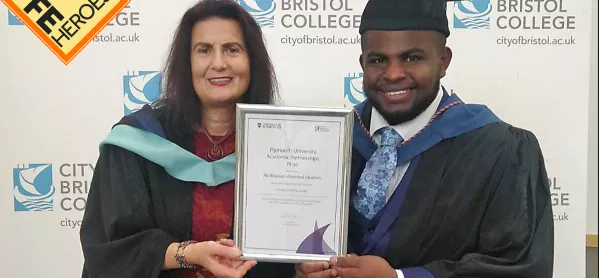FE Heroes: ‘The FE curriculum is out of touch’

What is your name, job title and place of work?
Slavica Talbot (pictured left), programme lead and business lecturer at City of Bristol College, levels 3 to 7.
How long have you held your current role, and what other jobs did you have before?
I have been in my current role since 2016, and previously I was the centre manager and programme coordinator at City of Bristol College.
Back home, in the former Yugoslavia, I was the managing director of a student employment agency and during the war, as a refugee in Croatia, I was appointed by the Bosnian parliament to lead the largest ex-territorial Bosnian refugee school in Europe with 750 pupils.
How - and why - did you first start working in further education?
I came to England on a charity trip in 1994 in the middle of the war and, for the next five years, continued to work with my friends in the UK collecting and distributing aid to schools and the war-torn areas. In 1999, I enrolled on an IT course at the City of Bristol College, which ended with a job offer of an assistant lecturer.
I have been with the college for more than 21 years now, turning down better opportunities elsewhere. I got attached to this city and the college culture of inclusivity and lifelong learning, which resonated with my passion for education. I believed I could make a difference in the college and the city, and still do.
FE Heroes: ‘Pastoral is as important as curriculum’
Meet Ann Limb: Further education icon
Queen’s birthday honours: Augar to receive knighthood
Briefly describe what a day at work looks like for you...
Each day is unique and brings different challenges. I teach full-time and deliver 10 different subjects across levels 3 to 7. I usually start at 8am and when I teach, all else is on hold. I also lead the HE business and management courses, hold module and pastoral tutorials, mentor and coach at master’s level, recruit, interview, complete admin tasks. There is no such a thing as an ordinary day of work.
What motivates you in your workplace?
My students are my infinite inspiration. They come to us with no strong networks, no money or support in life, knowing that knowledge might be the only tool they will ever have to better themselves. What they have is their determination to learn and us - the teachers. I see educators as the guardians of human minds, and that motivates me.
Share an anecdote about a student or learner who has inspired you...
A few years back, I had a business student whose private life was a rollercoaster: his parents were divorced, his mum was an addict and he had two younger siblings to look after. That student was my challenge, my heartache and my inspiration.
He frequently wanted to leave as it was too hard and at times impossible to carry the burden and study, but somehow I managed to motivate him to stay.
The student completed his degree, landed his first, well-paid job, bought a flat and took his siblings under his wing. It wasn’t me who changed the harsh reality of the student’s world, but the extreme hardship, determination and trust in me, our college and education which paid off at the end.
Do you enjoy working in FE? And if so, why?
Yes, I do. FE is a unique sector, diverse, interesting, dynamic and challenging above all. It is a home to students with scarce finance, grades too low to go to university, who have been let down by their previous education or have a tough family life, the lack of right guidance, and those already in employment wanting to advance their career.
It is the place where we discover hidden talent and save great young minds through knowledge and their yearning for a better life that would otherwise be wasted.
What do you see as the big challenges for the FE sector in the next few years?
Instability in government funding causing the lack of resources, the fluctuation of an underpaid, unappreciated workforce, an inadequate recruitment system and a lack of ability to recognise and retain talent.
What do you think our FE sector will look like in 30 years’ time?
To survive, modernisation is a must. I see it as a place with good utilisation of technology, blended learning as standard practice, improved physical spaces for learning that are friendlier minimalistic environments where students can move, think, experiment and collaborate.
With individually tailored programmes, more coaching and mentoring, less lecturing, with different types of assessments based on a student’s holistic understanding and skills, not grades capturing one moment in time. My vision might be seen as a utopia for realists but I believe it can be achieved.
If you were made apprenticeships and skills minister, what is the first thing you’d introduce or change?
I would conduct a rigorous evaluation of the curriculum across all levels, including apprenticeships and HE. FE curriculum is out of touch with modern, contemporary society.
I would reintroduce critical thinking, digital skills, science, as well as art, physical education, communication and emotional intelligence, as they are the prerequisites to become more creative and innovative, which is the only way to improve our economy, our quality of life and to save this planet we live on.
You need a Tes subscription to read this article
Subscribe now to read this article and get other subscriber-only content:
- Unlimited access to all Tes magazine content
- Exclusive subscriber-only stories
- Award-winning email newsletters
Already a subscriber? Log in
You need a subscription to read this article
Subscribe now to read this article and get other subscriber-only content, including:
- Unlimited access to all Tes magazine content
- Exclusive subscriber-only stories
- Award-winning email newsletters